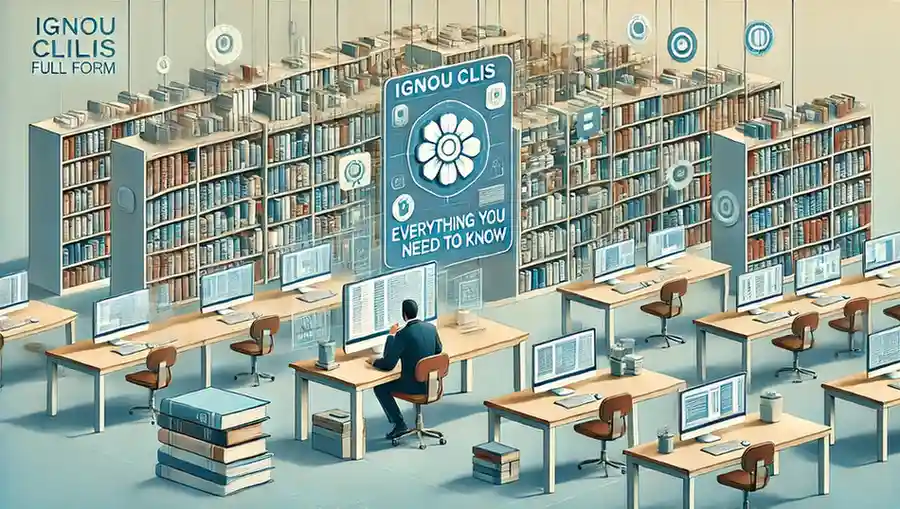Are you interested in pursuing a career in library and information science? The IGNOU CLIS program is one of the most accessible and flexible ways to start your journey. Whether you are looking to advance your career or simply gain specialized knowledge in the field, this Certificate in Library and Information Science (CLIS) program from Indira Gandhi National Open University (IGNOU) provides a great foundation.
In this comprehensive guide, we will explore everything you need to know about the IGNOU CLIS program—from the full form of CLIS to career prospects, eligibility criteria, and the unique advantages of studying with IGNOU.
Introduction
1. What is CLIS?
CLIS, which stands for Certificate in Library and Information Science, is an entry-level program designed for individuals interested in gaining a basic understanding of library systems and information management. The IGNOU CLIS program focuses on introducing students to the fundamental concepts, principles, and practices in library science, along with information technology applications within the library environment.
Whether you are a fresh graduate or a working professional, this program provides you with the skills and knowledge necessary to work in various library and information science-related roles. In today’s world, with increasing digital resources, the demand for skilled professionals in library management and information retrieval systems is higher than ever.
2. Why is CLIS Important?
The CLIS program holds significant importance because it prepares students for careers in the rapidly evolving world of information management. As technology plays a more prominent role in libraries and information centers, it is crucial to stay updated on the latest trends in digital library systems, information retrieval, and information organization.
This certificate equips you with the foundational skills necessary to pursue a career as a librarian, information officer, or archivist. More than just a traditional role, the CLIS program allows you to work across various industries, from government institutions to research centers to corporate organizations, all of which require efficient information management systems.
Full Form of CLIS
1. Clarifying CLIS: What Does it Stand For?
The full form of CLIS is Certificate in Library and Information Science. This certification program introduces students to library science, which includes the study of various aspects of libraries such as cataloging, information retrieval, and digital resources management.
The term library science refers to the practice of managing information in a systematic and organized manner to ensure its accessibility, while information science focuses on the technological aspects of organizing, processing, and disseminating information. In a world full of data, professionals with expertise in these fields are essential to help individuals and organizations access and manage information effectively.
2. Importance of CLIS in the Context of IGNOU
IGNOU’s CLIS program is designed to provide flexible and comprehensive education to students interested in pursuing careers in library and information science. Through this program, IGNOU offers a recognized certification that holds weight in academic and professional circles. The curriculum ensures that students are not only well-versed in traditional library science but also equipped with modern tools and techniques to manage digital libraries, online databases, and other cutting-edge systems.
IGNOU’s CLIS program is known for its accessibility and affordability, making it an ideal choice for individuals from various backgrounds who wish to gain expertise in library management.
Overview of the IGNOU CLIS Program
1. Course Structure and Duration
The IGNOU CLIS program is structured to provide students with a comprehensive overview of library science fundamentals. The program is typically completed in 6 months but can be extended up to 2 years, offering students flexibility in their learning pace.
The course is self-paced and modular, with both theoretical and practical components. Students are required to submit assignments, attend practical workshops (if applicable), and complete exams as part of the evaluation process.
Some of the major components of the program include:
- Fundamentals of Library Science
- Information Systems and Technology
- Library Cataloging and Classification
- Information Retrieval Systems
These courses ensure that you are well-equipped to manage physical and digital libraries, design information systems, and understand the technological trends in the field.
2. Eligibility Criteria for the CLIS Program
The eligibility criteria for the CLIS program at IGNOU are simple and open to many individuals:
- A high school diploma (10+2) or its equivalent from a recognized board.
- Students from any discipline are eligible to apply, making this program accessible to a diverse range of candidates.
Given that CLIS is a foundational program, prior knowledge or background in library science is not a requirement. This makes it a great option for anyone interested in entering the field, regardless of their academic background.
Core Curriculum of CLIS
1. Subjects Covered in the CLIS Program
The CLIS program at IGNOU covers essential subjects that equip students with the skills and knowledge necessary to work in the field of library and information science. Some of the subjects include:
- Library and Information Science: Basics and Concepts
Introduction to the fundamentals of library services, information storage, and retrieval. - Information Technology in Libraries
The use of technology to manage library resources and create digital systems for information storage and access. - Library Cataloging and Classification
Techniques for organizing and categorizing books, journals, and digital media in libraries. - Information Retrieval
Understanding how to search for and retrieve relevant information efficiently from databases.
2. Practical Components and Assignments
Along with theoretical knowledge, students also work on practical assignments where they get hands-on experience in:
- Cataloging and organizing books
- Using library management software
- Creating digital information retrieval systems
This combination of theory and practice ensures that students not only learn about library science but also gain valuable experience in applying these concepts in real-world situations.
3. Assessment Methods
The evaluation for the CLIS program typically includes:
- Assignments: Assignments to test your understanding of course materials.
- End-term Examinations: Exams conducted at the end of the program to assess overall knowledge.
- Practical Work: Some assignments may include practical projects or case studies that showcase your skills in information management.
Career Opportunities After Completing CLIS
1. Job Prospects in the Library Sector
Upon completing the CLIS program, there are various career opportunities available. Some of the roles include:
- Librarian: Manage and organize the resources of public or academic libraries.
- Archivist: Specialize in managing, organizing, and preserving valuable records and documents.
- Library Technician: Support librarians with cataloging, managing information, and assisting library visitors.
- Documentation Specialist: Manage documentation systems and ensure the accessibility of information for users.
The demand for skilled professionals in the library sector is growing as more institutions and industries recognize the importance of efficient information management.
2. Growth in Digital Libraries and Information Services
The rise of digital libraries, e-books, and online information systems has created many new opportunities for CLIS graduates. As libraries increasingly move to digital platforms, the demand for professionals skilled in digital library management, online catalogs, and information technology is skyrocketing.
Graduates with CLIS certification are well-equipped to work in digital archives, media houses, and online databases.
3. Industries and Sectors Hiring CLIS Graduates
While libraries and educational institutions are the most obvious sectors hiring CLIS graduates, many other industries also require information management professionals. Some of these include:
- Government Agencies: Managing and preserving public records.
- Corporate Sectors: Information management in large corporations.
- Research Centers: Organizing research materials and making them accessible.
A CLIS graduate can find roles in any of these sectors, making the program incredibly versatile.
IGNOU’s Recognition and Credibility in the CLIS Program
1. IGNOU’s Reputation in Higher Education
IGNOU is one of India’s largest and most well-known open universities, with a reputation for providing high-quality distance education. The CLIS program is no different. With a well-structured curriculum and practical relevance, the program ensures that students gain the expertise required to succeed in the library and information science field.
2. Affiliation with Global LIS Standards
IGNOU’s CLIS program is aligned with global standards in library and information science education. The program’s design is influenced by international best practices and aims to equip students with globally recognized skills. Moreover, IGNOU’s international collaborations provide students with access to a wider network of LIS professionals and academic institutions.
How to Apply for the IGNOU CLIS Program
1. Application Process Step-by-Step
Applying for the CLIS program at IGNOU is simple and can be done online. Here’s a step-by-step guide:
- Visit the Official IGNOU Website: Go to the admissions portal on the IGNOU website.
- Register for the Program: Fill in the necessary personal and academic details.
- Submit Documents: Provide scanned copies of your educational certificates.
- Pay the Fees: Pay the application fees via online banking, credit/debit card, or UPI.
- Confirmation: Once your application is successfully submitted, you will receive confirmation from IGNOU.
2. Registration and Admission Procedures
IGNOU usually accepts students twice a year: in January and July. Be sure to check the admission dates and follow the process before the deadline.
Specializations and Electives in CLIS
1. Specialization Options Within the CLIS Program
Although the CLIS program offered by IGNOU is primarily a foundational course, there are opportunities for students to specialize in various aspects of library and information science. While there may not be a formal “specialization” track within the CLIS certificate, students can tailor their studies to align with specific interests in the field. Some areas of focus that students can explore include:
- Digital Libraries: The management of digital collections, e-books, and online archives.
- Information Management Systems: The design and management of information retrieval systems and cataloging databases.
- Archives and Records Management: Specializing in managing historical documents, government records, and public archives.
These areas are especially relevant in today’s information-heavy world, where technology plays a central role in library and information management.
2. Advanced Study Opportunities in Library and Information Science
For those who wish to continue their education after completing the CLIS program, there are several advanced study options available. IGNOU offers Master’s Degree and Postgraduate Diploma programs in Library and Information Science that provide an in-depth understanding of the field. Some of these include:
- Master of Library and Information Science (MLIS)
- Postgraduate Diploma in Library Automation and Networking (PGDLAN)
These programs allow students to build on the foundational knowledge they gained in CLIS and specialize further in areas such as library automation, network management, and information technology integration.
Skills Developed Through CLIS
1. Technical Skills in Information Management
The CLIS program at IGNOU focuses on both theoretical knowledge and practical skills, ensuring that graduates are well-equipped to handle the evolving demands of information management. Some of the key technical skills developed include:
- Information Retrieval Systems: Understanding how to search and retrieve data from digital databases and online resources.
- Cataloging and Classification: Learning to manage both physical and digital collections efficiently through systems like Dewey Decimal Classification and Library of Congress Classification.
- Database Management: Gaining practical knowledge in managing library databases, including organizing and indexing materials in a digital format.
These skills are essential in today’s digital-first world, where information is constantly growing and needs to be organized efficiently for easy retrieval.
2. Soft Skills and Library Management
In addition to technical expertise, the CLIS program helps students develop important soft skills, such as:
- Communication: The ability to interact with library users and staff effectively.
- Organization: Managing and organizing library resources, both physical and digital.
- Customer Service: Assisting library visitors and users in finding the information they need.
Effective library management also requires leadership, teamwork, and problem-solving skills, all of which are emphasized throughout the program.
3. Digital Literacy and Online Resource Management
One of the major benefits of the CLIS program is the emphasis on digital literacy. With libraries increasingly relying on digital catalogs, e-resources, and online libraries, it’s crucial for students to gain proficiency in managing these online resources. The program teaches students how to:
- Manage digital content and e-books.
- Use digital library management systems and cloud-based storage.
- Navigate online databases and information retrieval tools.
These skills are vital for anyone looking to work in today’s tech-driven library environment.
Benefits of Pursuing CLIS from IGNOU
1. Flexibility for Working Professionals
One of the most appealing aspects of the IGNOU CLIS program is its flexibility. Since IGNOU operates on a distance learning model, students can study at their own pace, which is ideal for working professionals or those with other commitments. Here’s why this flexibility is so beneficial:
- Self-paced learning: Students can take the time they need to understand concepts without the pressure of a strict classroom schedule.
- No commuting required: You can study from home, making the program more accessible to individuals who may not have the time or resources to attend traditional university programs.
- Part-time study options: The program’s modular approach allows students to balance work and study seamlessly.
This flexible learning approach makes it possible for anyone, no matter their situation, to pursue a Certificate in Library and Information Science from the comfort of their own home.
2. Cost-Effectiveness of the CLIS Program
Compared to traditional university programs in library science, IGNOU’s CLIS program is highly affordable. With low tuition fees, minimal administrative costs, and access to high-quality educational materials, the program offers cost-effective education without compromising on quality.
Moreover, IGNOU offers financial assistance and scholarships for eligible students, further reducing the financial burden. This makes it an excellent option for individuals looking to enter the field of library and information science without incurring high educational costs.
3. Access to Global Resources and Networks
IGNOU’s CLIS program connects students to a global network of libraries, information professionals, and academic institutions. Through online forums, discussion groups, and collaborations, students gain access to a wide range of academic resources, research opportunities, and professional networks.
Being a part of IGNOU’s global network also opens doors for international career opportunities in libraries, research centers, archives, and information management firms.
Success Stories of CLIS Graduates
1. Notable CLIS Graduates from IGNOU
Many CLIS graduates from IGNOU have gone on to have successful careers in library science and information management. Here are a few success stories:
- Ravi Kumar, a former CLIS student, now works as a senior librarian in a reputed university, managing digital collections and conducting information literacy workshops for students.
- Anjali Sharma, another CLIS graduate, went on to work for a government organization managing public records and archival materials.
These success stories highlight the versatility and value of the CLIS program in enabling graduates to find meaningful employment in a variety of fields.
2. Impact of CLIS on Career Advancement
Graduates of the CLIS program often see significant career advancement after completing the program. Whether they move into leadership roles within libraries, take on digital library projects, or work in corporate information management, the CLIS certificate helps boost employability and opens doors to higher-paying positions and promotions.
Common Myths About the CLIS Program
1. Misconceptions About Distance Learning in Library Science
There are several misconceptions surrounding distance learning programs like the CLIS program. Some of the most common myths include:
- Myth: Distance learning programs are not as effective as traditional programs.
- Reality: The CLIS program at IGNOU follows a rigorous curriculum, and the self-paced learning model ensures that students gain a strong foundation in library science.
- Myth: Distance learning programs are not recognized in the professional world.
- Reality: IGNOU’s CLIS certificate is recognized by academic institutions, government organizations, and corporate sectors around the world.
2. Is CLIS Only for Library Jobs?
While the CLIS program prepares students for traditional librarian roles, it is not limited to just libraries. CLIS graduates can also pursue careers in:
- Corporate information management: Managing corporate data and archives.
- Research: Organizing research data and literature.
- Digital information management: Working with digital archives, e-books, and cloud-based systems.
Comparison with Other LIS Programs
1. CLIS vs. Traditional Library Science Programs
While IGNOU’s CLIS program is a distance learning program, traditional on-campus LIS programs often provide more in-depth, face-to-face interactions. Here are the key differences:
- Flexibility: IGNOU’s program offers greater flexibility, allowing students to study at their own pace.
- Cost: The CLIS program at IGNOU is much more affordable than traditional on-campus programs.
2. CLIS vs. Other Distance Learning Library Programs
Several universities offer distance learning programs in library science, but IGNOU stands out due to its:
- Reputation: As one of India’s largest and most respected distance learning institutions.
- Wide Accessibility: With a comprehensive online platform and global recognition.
The Future of Library and Information Science Education
1. Emerging Trends in Library Science
As the field of library science continues to evolve, there are several emerging trends that CLIS graduates can take advantage of:
- Digital Libraries: The growth of digital archives, e-books, and online libraries is creating demand for information professionals who can manage digital collections.
- Artificial Intelligence in Libraries: AI-driven systems are being used for information retrieval and automated cataloging.
- Data Science: The increasing need for data management has led to opportunities in data-driven libraries.
2. Future Opportunities for CLIS Graduates
The future for CLIS graduates looks promising, with many new career paths opening in digital and online libraries, corporate information systems, and research institutes.
Conclusion
1. Summary of the CLIS Program and Its Importance
The CLIS program at IGNOU is an excellent choice for anyone looking to start a career in library and information science. With a flexible learning format, affordable fees, and global recognition, it offers a solid foundation for students interested in this growing field.
2. Encouragement to Pursue the Program
If you are passionate about information management and want to build a career in the field of library science, the CLIS program at IGNOU is a perfect starting point. It offers comprehensive training, real-world applicability, and career growth potential, all in a flexible and affordable package. Don’t hesitate—enroll today and take the first step toward a rewarding career in library and information science.
FAQs
What is the duration of the IGNOU CLIS program?
The IGNOU CLIS program is typically completed in 6 months but can be extended up to 2 years depending on the student’s pace and convenience. This flexible duration allows students to balance their education with personal or professional commitments.
What are the eligibility requirements for enrolling in the IGNOU CLIS program?
To enroll in the CLIS program, applicants need to have completed 10+2 or its equivalent from a recognized board. The program is open to students from all disciplines, making it accessible to a wide range of individuals interested in library and information science.
Can I work while pursuing the IGNOU CLIS program?
Yes! The IGNOU CLIS program is designed as a distance learning course, which allows students the flexibility to study at their own pace. This makes it an excellent option for working professionals who wish to pursue a career in library and information science without having to quit their job.
Related Posts:
- IGNOU English Project Front Page 2025: A Comprehensive Guide for Students
- IGNOU NEP Orientation & Sensitization Programme 2025: A Comprehensive Guide
- 38th IGNOU Convocation 2025: Registration, Fee Payment, Criteria, Best Guide
- Admission For BLIS Program in IGNOU: A Comprehensive Guide for 2025
- Pursuing LLB Program from IGNOU 2025: Fees, Admission process, Study Material, Best Guide




